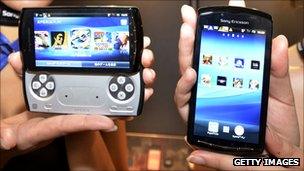Can Sony succeed where Sony-Ericsson partnership failed?
- Published

Despite launching new products, Sony Ericsson has been losing its market share
Desperate times call for desperate measures. The phrase is a perfect way to describe Sony's reported interest in buying out Ericsson's stake in their joint venture.
At its peak in 2007, Sony Ericsson enjoyed a 9% share of the global mobile phone market and was the fourth largest phone manufacturer.
Things have changed drastically since. The mobile phone has been transformed from an ordinary gadget to a pocket computer.
The "smartphone" has gone from being a niche product to a mass market one but Sony Ericsson has not been able to keep pace with its competitors.
In the second quarter of 2011, its market share fell to 2% and it now ranks 11th on the list of phone manufacturers.
"They originally came together to incorporate the Ericsson technology and the Sony brand, but they haven't been able to achieve much with the combination," says Bryan Ma of IDC Asia-Pacific.
Feeling hampered?
While the 10-year long partnership between the two companies has more or less been a smooth one, analysts say the association may have run its course.
"When the joint venture was formed, mobile phone technology was simple and Ericsson's inputs in that area suited Sony's purposes," says Tim Charlton of Charlton Media.
"Now things have changed. Phones are much more advanced and Sony feels it is hampered by the fact that Ericsson doesn't bring much to the table with regard to the smartphone segment," he explains.
Mr Charlton adds that the inability of Sony Ericsson to come up with a product that can challenge its competitors is beginning to hurt.
"It is clear that the smartphone is at the heart of the consumer electronic experience," he says. "Sony must be feeling frustrated that they are locked out of this domain."
Analysts say the 50-50 partnership has played a role in hurting the company's product development.
"Whenever decisions are made at one end, they need approval from the other," says Melissa Chau of IDC Asia-Pacific.
"That has hindered their ability to bring new products to the market at a fast pace," she adds.
Ms Chau explains that this has been a big hurdle, given the speed with which technology is evolving in the mobile phone market.
Leveraging Sony
So the big question is: can Sony succeed alone where the Sony-Ericsson partnership has failed?
Analysts say though it is difficult to predict, the key to its success lies in how well it can leverage its other businesses to support the smartphone segment.
"They already make games, own music rights and know what a consumer wants," says Mr Charlton.
At the same time, Sony's already established network of marketing, distribution and retail channels may help it push through the products much better.
However, analysts say that for all of this to work, the single most important factor will be coming up with the right product.
"They have the pieces in place but are missing the right kind of device to bring it all together," Mr Charlton explains.
"Currently they have an A-grade team playing on a C-grade infrastructure," he adds.
Value for money
According to some estimates, it may cost Sony as much as $1.3bn (£830m) to buy Ericsson's stake in the joint venture.
Analysts say whether that is a fair value will depend on a variety of factors, not least the patent ownership.
"How the patents held by the company are shared, will determine the final value of the deal," says Gerhard Fasol of Eurotechnology Japan KK, a company that helps firms with merger and acquisitions.
"Patents are an important component of success in the smartphone arena. They can give you the right to block sales of the competitors and vice-versa," he explains.
Mr Fasol cites the example of the ongoing legal battle between Apple and Samsung as a prime example of this.
Sony will also have to convince its shareholders that any such move is in the best interests of the company and will contribute towards its growth.
This may be a tricky affair as Sony's stock price has plunged 50% in the last eight months on the Tokyo Stock Exchange amid falling profits.
It reported a loss of $3.1bn for the year to 31 March, the third successive year that it has lost money.
However, it has forecast a profit of 80bn yen ($976m; £600m) for the current financial year.
Analysts say that as demand for its traditional products such as TVs slows down, Sony needs to succeed in fast-growing segments like smartphones and tablet PCs to achieve that target.
Whether buying out Ericsson's stake in their joint venture can help it turn the tables will only become clear if the deal does eventually happen.
After all, the proof of the pudding is in the eating.
- Published6 October 2011
- Published12 October 2011
- Published15 September 2011